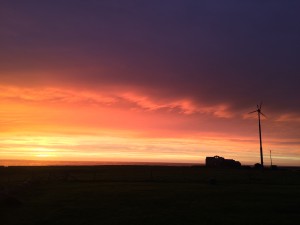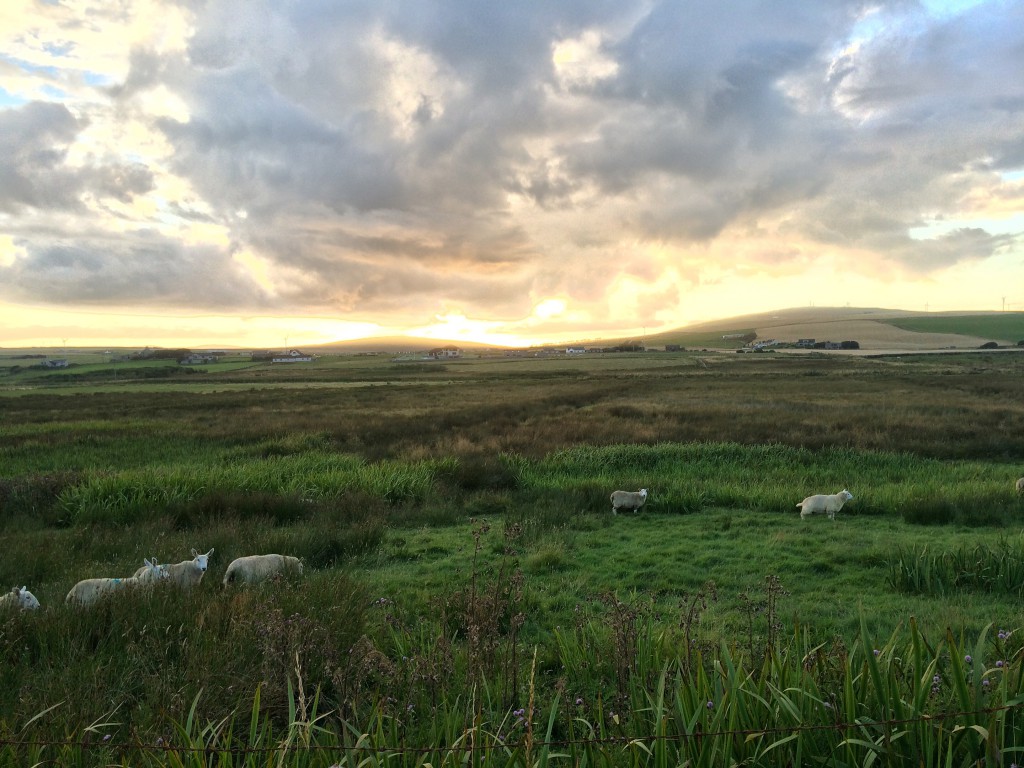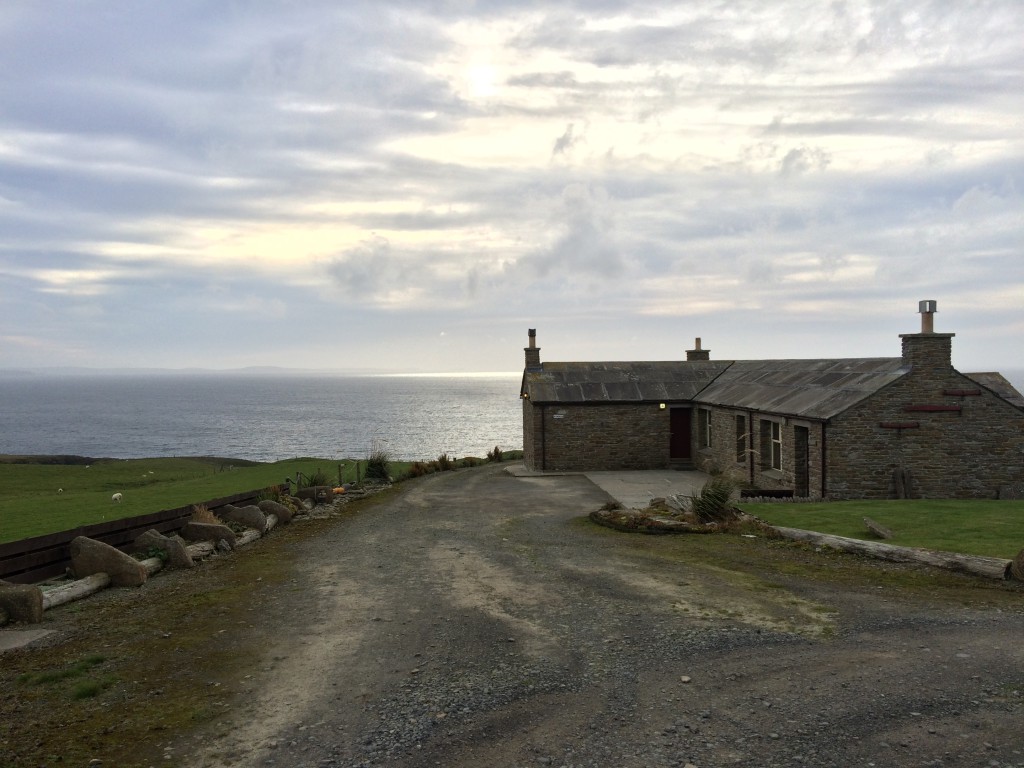North Ronaldsay, Orkney.
 After spending the fifth year of my medical degree in the Rural Medical Immersion Programme, and loving my time in a rural setting, I knew I wanted to continue to seek rural experiences on my medical elective. I also wanted it to provide me with an opportunity to explore a part of the world I hadn’t been to, as well as the ability to gain experience in a health care system that was comparable to New Zealands. This led to looking around the outer isles of Scotland for a rural elective. I emailed most of the outer isles but Orkney was first to get back to me hence why I chose to go with them.
After spending the fifth year of my medical degree in the Rural Medical Immersion Programme, and loving my time in a rural setting, I knew I wanted to continue to seek rural experiences on my medical elective. I also wanted it to provide me with an opportunity to explore a part of the world I hadn’t been to, as well as the ability to gain experience in a health care system that was comparable to New Zealands. This led to looking around the outer isles of Scotland for a rural elective. I emailed most of the outer isles but Orkney was first to get back to me hence why I chose to go with them.
The Orkney islands are an archipelago of islands north of Scotland. There are ~20 inhabited islands in this archipelago. The total population is approximately 20,000 with 7,500 living in the main village of Kirkwall. The primary industries of the isles are oil, dairy, tourism, and wind farms. There are no trees and no hills, just wind turbines, mounds of grass that are referred to as hills, and cows. It is home to the famous Highland Park whiskey distillery, but there is also the Scapa whiskey distillery, two beer breweries and four gin distilleries on the mainland. Many traditions run strong amongst the Orcadians, but none finer or more fiercely competed for than the annual christmas and new year ‘Ba’ games. This is hard to explain in less than a few words, but briefly depending on where you were born you become an ‘uppie’ or a ‘doonie’. You compete as a group for the Ba, starting in the centre of town and aiming to get it to either the sea or the site of the old church gates depending on the team you play for. There are usually in excess of 300 men playing and games last for hours and hours – it is well worth a quick google or youtube to see the passion of the occasion.
Getting to the Orkney Islands is a bit of a mission and quite expensive compared to many flights within Europe. Flights to Orkney leave from both Aberdeen and Edinburgh and there are also a number of ferries that depart from mainland Scotland. These range from an overnight ferry from Aberdeen or a shorter ferry from John O’Groats at the most northern tip of the United Kingdom.
Balfour hospital is the hospital on ‘Mainland Orkney’ situated in the largest town of Kirkwall. Balfour hospital has accommodation on site for students. It costs less that 10 pounds per night and is more than adequate. The accommodation block has around 30 beds so plenty of people to meet and socialize with outside of working hours. It was easy enough to get to get sorted at Balfour hospital, our only hiccup was that the hospital required our HIV and Hepatitis screening to be done by a registered United Kingdom laboratory. So our test results from NZ were unacceptable. It seemed a bit odd that our laboratories were not up the ‘verified status’ of UK laboratories, but given the BREXIT sentiment that was infiltrating the United Kingdom at that time we weren’t about to kick up a fuss. We got it all sorted on Orkney and so didn’t turn out to be a major drama.
The hospital itself provided an experience that was perfect for transitioning from a TI to a house surgeon. Balfour hospital is a 35 bed hospital, that comprises of 17 acute beds, 3 HDU beds and 15 rehab beds. There is a separate hospice/cancer unit that has 4 beds. There are general surgeons (and general in the truest sense ie. orthopaedics, caesarean-sections, cholecystectomies are all done by the same surgeon), general physicians and anaesthetists. There are no paediatricians. A&E is covered by everyone.
Kirkwall, Orkney
I started off on general medicine.  Day two I was given a pager, told that I would be taking all calls from GPs and was to see all new patients in A&E. By day three I had to lead the ward round with the consultant writing notes. This was a role reversal that I didn’t expect, and have never seen in NZ. The consultant was always available to ask questions and see patients, but gave me the opportunity to see patients first and deal with communications over the phone – something that has to be experienced rather than taught. I participated in everything rather than just observing. I felt I had lesson after lesson on what is practical and applicable in a rural setting versus a tertiary centre.
Day two I was given a pager, told that I would be taking all calls from GPs and was to see all new patients in A&E. By day three I had to lead the ward round with the consultant writing notes. This was a role reversal that I didn’t expect, and have never seen in NZ. The consultant was always available to ask questions and see patients, but gave me the opportunity to see patients first and deal with communications over the phone – something that has to be experienced rather than taught. I participated in everything rather than just observing. I felt I had lesson after lesson on what is practical and applicable in a rural setting versus a tertiary centre.
There are two full time physicians at the Balfour and technically they each work on call once every four weeks with the other weeks covered by locum physicians. But the reality is that the full-time physicians take on much more than the one week in four they are on call. Given the transient nature of locum placements, all outpatient clinics and follow ups on tests, biopsies etc are left up to the doctors based in Orkney. This workload coupled with the resources available in Orkney meant that the physicians were extremely pragmatic. Blood tests were not done every day because they didn’t need to be done every day. This was quite a different attitude compared to previous seniors who have stated quite matter of factly “a patient in hospital requires blood tests every day – no matter what!”. CT scans were ordered only when absolutely necessary. Balfour hospital has only had a CT scanner for one year. The physicians and surgeons aren’t used to it being there, and it isn’t in constant use. Ultimately they rely on clinical judgement more than radiology, which is what we should all be doing in the first instance. But when the facilities are there, I can see how it is easy to fall into the trap of ordering it because you can. How would we go if we turned off radiology for a day? It would be unethical to do that given the diagnostic utility and planning ability a lot of the imaging we do provides us – but how many scans do we do that add nothing to what we do?
Retrospectively I did wonder whether if we spent the majority of medical school clinical time in GP practices and emergency rooms, we would all be set up for a better life as a junior doctor. We would see every presenting complaint there is, see a representative proportion of every specialty, and start with a wider base of general knowledge rather than a more confined knowledge of the few specialist runs you have done. Sure there needs to be time spent on wards. But ward management skills are mostly generic skills and an ability to understand how your seniors prefer things done is probably the most important skill to learn. By making everyone do sub-specialties as medical students are we narrowing our potential early? These are probably idealistic musings. Arguments can be made for improving error rates by consolidating your knowledge in one area. But as junior doctors rotate around everything for a couple of years I don’t think a week learning about the finer details of the genetic background of paediatric syncope will be helpful until about 10 years down the track. Are we being educated to be partialists before we learn to be generalists….?
Time was also spent on the outer islands with Nurse Practitioners and GPs. The islands where I spent time had populations ranging from 50 to 300 people. There was a lot of down time on these islands, as the clinicians only did half day clinics and spent the rest of their time ‘on-call’. It is an interesting life being a solo GP on a remote island. The skill set required is quite different to that of an urban GP. Given that any air ambulance was at least 2.5 hours away the GPs needed to be comfortable with managing quite sick patients with limited gear.
As the crow flies, all of the isles are reasonably close to mainland Orkney, with none being more than a 15 minute plane ride away. (As an interesting aside, the world’s shortest commercial flight operates in the Orkney Isles – Papa Westray to Westray has an air time of ~1 minute). But none of the isles are logistically close at all in terms of emergency medical care. There are ferries, but they require reasonable sea conditions. There are no aircraft on Orkney that are medically equipped for retrieval, these are all based on mainland Scotland. Luckily, or appropriately I should say, there is an emphasis that all medical staff on the isles are involved in ongoing teaching and reflection on cases.
We were lucky enough to attend the outreach session from the Scottish Air Ambulance service with GPs, nurse practitioners and nurses from within the Balfour and from the outer isles. Scotland, interestingly, has a nationalised air ambulance service. Air transfers and retrievals are not run by different helicopter trusts from different regions like in England (and NZ) – but are a government funded group based out of Glasgow that service all of Scotland. They have about 30 consultants from all over Scotland who travel to the Glasgow base for 1-2 days a month when they are on a 24-48 hour call for this service. There are registrars and advanced paramedics who are also situated at the base to allow for a reasonably large team to cover all of Scotland. Each of the consultants has a rural hospital or area that they are responsible for going to each year to provide ongoing training and discuss cases that have come from that hospital in the previous year. So on the day we attended, there were discussions centred around the cases that had been flown from the Orkney Isles and education session specific to the Orkney Isles that might not be as relevant to other areas around Scotland. It was a superb day and both of us walked away with dreams of working as a registrar on this service one day in the future.
The down time out of clinics was a great opportunity to explore these little islands and meet the people who lived there and find out why they lived there. I will never forget the woman who told me she had left the Orkney Islands but now she had returned “home… and I mean home with a capital H”. It was quite brilliant.
I feel really lucky to have been in the Balfour hospital and been given a huge opportunity to practice being a junior doctor under close supervision before having that real responsibility back home. I highly recommend a rural elective to other final year medical students. We were always busy, but no-one was ever so busy they lost their compassion for the patient or had to take shortcuts. I didn’t see anything super specialised being done in the hospital. That may be what some want to see, and if so, then don’t go to a rural hospital. You will however see pragmatism at its best and magnificent utilisation of resources.
I highly recommend a rural elective to other final year medical students. We were always busy, but no-one was ever so busy they lost their compassion for the patient or had to take shortcuts. I didn’t see anything super specialised being done in the hospital. That may be what some want to see, and if so, then don’t go to a rural hospital. You will however see pragmatism at its best and magnificent utilisation of resources.
Finally, I have to give thanks to the Pat Farry Rural Trust. They are an amazing resource for people involved in healthcare who want to know about, or get involved in rural medicine. This scholarship opened up an opportunity I would not have had otherwise and I will be forever grateful for that.
No comments yet.
Leave a comment